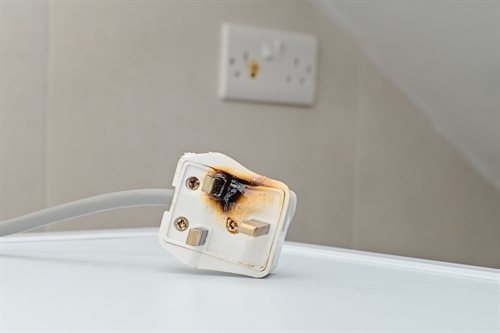Smoke alarms save lives. The risk of dying in a house fire increases eightfold if you don’t have a working smoke alarm in your home. Putting a smoke alarm on each floor of your home could save your life in the unfortunate event of a house fire. A prompt warning of a fire can also help reduce the impact of smoke damage.
But do you know what you should do if your smoke alarm goes off?
When your smoke alarm goes off, get out and stay out
Never ignore a smoke alarm. If you can’t say for sure that it’s a false alarm, treat it as a real fire and get people and pets out of the house calmly and quickly. Don’t stop to collect belongings during a fire emergency.
Call 999 from outside your home
Call for help once you’re all safely outside. Don’t go back into the building until the firefighters have told you it’s safe.
Do you have an emergency plan for your home?
Having an emergency plan means that everyone knows what to do should the worst happen, like a fire. We’ve got a blogpost that you can use to talk with your household about emergency planning.
Should I turn my smoke alarm off?
Most smoke alarms have a hush button that you can use if you know the alarm has been triggered by – for example, smoke from burning toast. But only use your smoke alarm’s hush button if you’re sure there is no fire.
Why is my smoke alarm going off when there’s no fire?
Smoke alarms are sensitive and can be triggered by various things. High humidity can set them off, as can a build-up of dust or dirt and some people say that volatile chemicals, as found in paint, chlorine bleach and ammonia, could set off a smoke alarm, too.
Smoke alarms that are approaching the end of their product life can become extra sensitive and may go off when there is no fire. Smoke alarms have a lifespan of eight to ten years and will need replacing from time to time. Many alarms will have the replace-by date on the casing. If your alarm is older than ten years, it’s best to replace it. Smoke alarms should be disposed of with electrical waste.
Smoke alarms will let you know if the battery is running down by making a periodic chirping sound. Replacing the battery will stop the chirping and ensure that your smoke alarm is still protecting your family and your home from fire. Some alarms have a sleep easy function to silence a low battery chirp until you can replace the battery – but consider keeping a few smoke alarm batteries handy so you can do a quick middle-of-the-night replacement and then get back to sleep knowing you are still protected from smoke.
Do you test your smoke alarm?
Smoke alarms save lives – but only if they’re working! So it’s a good idea to hit the test button on your smoke alarm every once in a while. According to the English Housing Survey, 91% of households have a working smoke alarm, but only 25% of those take time to test it at least monthly. Testing your smoke alarm each week is an easy, reassuring habit to get into and it might save your life one day.



